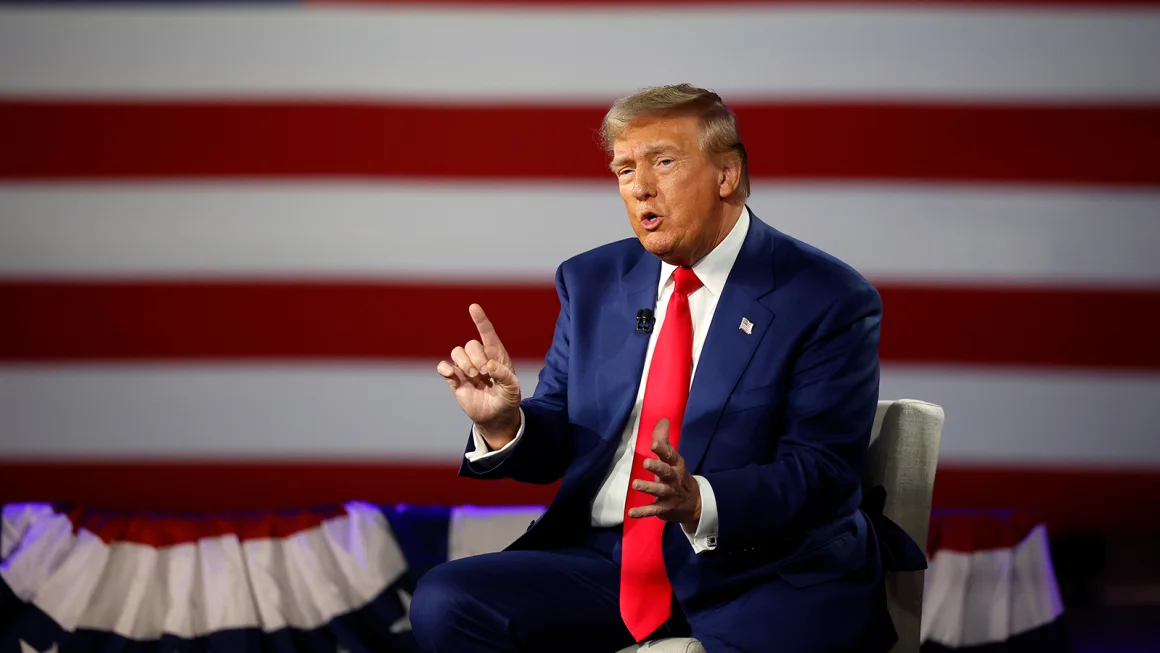How Liz Cheney tried to give GOP women permission to vote for Harris

Republican women can vote for Kamala Harris — and they don’t need to tell anyone about it.
That was the most striking takeaway from Liz Cheney’s blue wall swing-state tour with the vice president on Monday, as the hardline conservative and former congresswoman created a permission structure of personal empowerment for suburban Republican and independent women to snub Donald Trump and back the Democratic nominee.
The mother of five, who was staunchly anti-abortion as a lawmaker and who cheered the demise of Roe v. Wade, also warned women aren’t getting needed reproductive health care after the Supreme Court’s momentous 2022 decision and said that only Harris had the compassion to deal with the issue.
Cheney repeatedly made clear she still opposes abortion but explained in Waukesha County, a swing district just outside Milwaukee, that “I have been very troubled, deeply troubled by what I have watched happen in so many states.” She added, “I have been troubled by the extent to which you have women who, as the vice president said, in some cases, have died, who can’t get medical treatment that they need because providers are worried about criminal liability.”
She added: “We are facing a situation today where I think that it’s an untenable one.”
Cheney was speaking in her third event of the day with Harris, which included earlier stops in Pennsylvania and Michigan and in which she often made a more expansive case against the Republican nominee than the vice president has made herself.
Earlier, in a Detroit suburb, Cheney had noted that some Republicans feared reprisals, even violence, if they came out against Trump. “I would just remind people, if you’re at all concerned, you can vote your conscience and not ever have to say a word to anybody,” Cheney said, as she sat side-by-side with Harris. “There will be millions of Republicans who do that on November 5.”
Cheney was once on the fast track to the top of the GOP. But she was toppled as House GOP conference chair for condemning her party for covering up for Trump over the January 6, 2021, attack on the US Capitol. A pro-Trump challenger then took her Wyoming seat in a 2022 primary.
But her appearance alongside Harris shows she’s not given up on principled politics simply because she lost power. It also points to one of the most critical factors in the final days of the general election campaign — whether the Democratic vice president can win over significant numbers of Republicans.
Why Trump may need to turn to Haley
The Harris campaign is appealing to GOP voters who are disaffected with Trump’s wild and vulgar behavior, perceived threats to the Constitution and propensity to pal around with tyrants in a way that horrifies the hawks of the Bush and Reagan administrations — including Cheney’s father, former Vice President Dick Cheney.
Some of those voters may come from the tens of thousands of Republicans who voted for former South Carolina Gov. Nikki Haley in her failed primary campaign against Trump earlier this year. Trump has suggested in recent days that he may appear with his former rival to try to appeal to the same voters. But even if Harris can enlist a small fraction of those voters, or convince them not to back Trump, it could be decisive in swing states with razor-thin margins.
But she can’t do it alone. Such voters need to be approached gently since she’s asking dissident Republican voters to shelve some of their most cherished political positions. That’s why Cheney could be so valuable for Harris. She has huge credibility among some voters because of her untamed conservative ideology and her defense of what she regards as America’s most fundamental principles.
“I’m a conservative. And I know that the most conservative of all conservative principles is being faithful to the Constitution,” Cheney – who was the vice chair of the House select committee investigating January 6 – said in Chester County, Pennsylvania, a suburb of Philadelphia. “You have to choose in this race between someone who has been faithful to the Constitution, who will be faithful, and Donald Trump, who – it’s not just us predicting how he will act. We watched what he did after the last election. We watched what he did on January 6,” Cheney warned.
A stark warning on women’s health care
Cheney’s fears for the Constitution were largely familiar. More notable were her remarks on the aftermath of the Supreme Court – with a conservative majority built by Trump – overturning the federal constitutional right to an abortion.
She is not repudiating her life-long opposition to abortion. But Cheney cited what she said were discussions about the Texas attorney general suing for women’s medical records. She also appeared to be rebuking conservative legislatures and officials whose hardline steps have resulted in the withdrawal of vital health care services. In some cases women have been deprived of emergency abortions or other vital reproductive care when their lives have been at risk. Democrats also earlier this year seized on a halt to IVF treatments in Alabama after the state Supreme Court ruled that frozen embryos were human beings and that those who destroy them could be liable for wrongful death. The state’s GOP governor later signed into law a bill aimed at protecting IVF patients, but Democrats cite the case to highlight the chaos and lost rights that they blame directly on Trump.
Cheney, who would have known her daylong remarks would case a stir, was willing to engage on this topic. In Pennsylvania, for example, she intervened in the discussion after Harris addressed the subject. And she spoke after the vice president pledged to sign a law restoring the nationwide right to an abortion if she is president and Congress passes it.
Cheney’s voice on this issue was a clear sign that the Harris campaign believes that her value to the vice president goes far beyond highlighting Trump’s autocratic instincts and threat to democracy. Cheney may have become a bridge to millions of Republican women, especially in the critical swing-state suburbs, who may be staunchly opposed to abortion but do not support policies that may threaten their health.
Cheney’s appearances with Harris came as the vice president seeks to further widen a massive gender gap with the ex-president among women voters. A New York Times/Siena College poll this month showed Harris leading women voters by 56% to 40% over Trump. The GOP nominee was up 53% to 42% among men.
The former president has struggled to discuss abortion and to effectively address women during this campaign. He trawls for credit for the Supreme Court’s momentous ruling while seeking to avoid its political consequences. He’s claimed falsely that all women were happy with the decision. He’s overbearingly promised to serve as their “protector” if he wins back the White House and claimed bizarrely last week, at a town hall with an all-female audience, that he was the “father” of IVF.
Trump’s struggles with women voters
Harris’ events with Cheney raised the question of just how many Republican voters might be in reach for her. The New York Times poll found that 9% of likely Republicans planned to vote for her and only 3% of Democrats expected to vote for Trump. If that happened in November’s election, it would represent a significant challenge to Trump’s chances. Still, given the country’s polarization, there are still real doubts that large numbers of Republicans or even conservative-leaning independents will break toward the Democratic nominee.
But the Trump campaign appears to understand the risks. The former president said in Philadelphia on Sunday that Haley “wanted to join” him on the campaign trail. And CNN reported last week that the campaign had been in talks with the former South Carolina governor about a first appearance with Trump, who has held events in recent weeks tailored to female voters, including with his former White House press secretary, Arkansas Gov. Sarah Huckabee Sanders.
Trump may not have helped his deficit with women voters or disaffected Republicans over the weekend with his wild antics and vulgar comments about late golfer Arnold Palmer’s anatomy, although such crude politics could enhance his authenticity with many of his loyal base voters.
“If you’re talking about the kind of Republican who has found Trump’s influence on the party to be noxious, you look at this and you go, ‘See, I can’t vote for that guy. I can’t do this,’” Republican pollster Kristen Soltis Anderson told Kasie Hunt on “CNN This Morning” on Monday. “But at the same time, is there somebody who doesn’t care at all about politics but sees these clips in his life behind that as kind of funny? They really do exist, and they are part of Trump’s coalition.”
Trump’s team also sought to mine another seam of his appeal in its efforts to discredit Cheney. The former president pointed out that her father had been a Bush administration architect of the Iraq and Afghan wars, which caused deep fatigue with foreign interventions and helped paved the way for his own political rise.
“Dick Cheney is an irrelevant RINO, along with his daughter,” Trump wrote on Truth Social, while adding Harris to a triumvirate that he said supported “Endless Nonsensical Wars” that wasted lives and cost trillions of dollars.
Ultimately, the ostracizing of the Cheneys from the Trump-era GOP points to the ex-president’s extraordinary transformation of the party. And only one side of the Republican Party’s family schism will be happy after the election.



